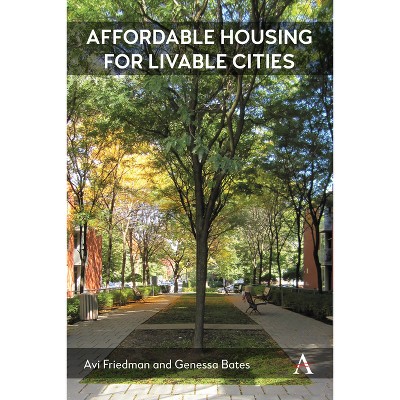Sponsored

The Housing Divide - by Emily Rosenbaum & Samantha Friedman (Hardcover)
In Stock
Sponsored
About this item
Highlights
- The Housing Divide examines the generational patterns in New York City's housing market and neighborhoods along the lines of race and ethnicity.
- Author(s): Emily Rosenbaum & Samantha Friedman
- 309 Pages
- Social Science, Sociology
Description
About the Book
"An excellent and timely volume, very well written, clearly organized, and cogently argued." --Douglas Massey, Professor of Sociology, Princeton UniversityThe Housing Divide examines the generational patterns in New York City's housing market and neighborhoods along the lines of race and ethnicity. The book provides an in-depth analysis of many immigrant groups in New York, especially providing an understanding of the opportunities and discriminatory practices at work from one generation to the next. Through a careful read of such factors as home ownership, housing quality, and neighborhood rates of crime, welfare enrollment, teenage pregnancy, and educational achievement, Emily Rosenbaum and Samantha Friedman provide a detailed portrait of neighborhood life and socio-economic status for the immigrants of New York.The book paints an important, if disturbing, picture. The authors argue that not only are Blacks--regardless of generation--disadvantaged relative to members of other racial/ethnic groups in their ability to obtain housing in high-quality neighborhoods, but that housing and neighborhood conditions actually decline over generations. Rosenbaum and Friedman's findings suggest that the future of racial inequality in this country will increasingly isolate Blacks from all other groups. In other words, the "color line" may be shifting from a line separating Blacks from Whites to one separating Blacks from all non-Blacks.Book Synopsis
The Housing Divide examines the generational patterns in New York City's housing market and neighborhoods along the lines of race and ethnicity. The book provides an in-depth analysis of many immigrant groups in New York, especially providing an understanding of the opportunities and discriminatory practices at work from one generation to the next. Through a careful read of such factors as home ownership, housing quality, and neighborhood rates of crime, welfare enrollment, teenage pregnancy, and educational achievement, Emily Rosenbaum and Samantha Friedman provide a detailed portrait of neighborhood life and socio-economic status for the immigrants of New York.
The book paints an important, if disturbing, picture. The authors argue that not only are Blacks--regardless of generation--disadvantaged relative to members of other racial/ethnic groups in their ability to obtain housing in high-quality neighborhoods, but that housing and neighborhood conditions actually decline over generations. Rosenbaum and Friedman's findings suggest that the future of racial inequality in this country will increasingly isolate Blacks from all other groups. In other words, the "color line" may be shifting from a line separating Blacks from Whites to one separating Blacks from all non-Blacks.
Review Quotes
"[W]ill be fascinating for policy makers and scholars concerned with housing patterns and racial discrimination."-- "Jewish Book World"
"An excellent and timely volume, very well written, clearly organized, and cogently argued."--Douglas S. Massey, author of Beyond Smoke and Mirrors: Mexican Immigration in an Era of Economic Integration
"Casts much light on longstanding debates over the assimilation and economic advancement of foreign immigrants in the USA."-- "Society"
"The authors offer a particularly balanced, thorough discussion in chapter 1 of how residence both reflects socioeconomic status and helps to determine it"-- "American Journal of Sociology"
"The Housing Divide brilliantly transforms the Big Apple into a crystal ball for glimpsing the racial and ethnic future of 21st century America. The core findingthat, just as in the past, racial discrimination keeps Americans with African ancestry from taking advantage of opportunities used by the newest immigrants and their children to get aheadportends a troubling future in which American society may cleave between blacks and non-blacks. This book is a wake-up call to America to finally address racial discrimination in housing."--Richard Alba, co-author of Remaking the American Mainstream: Assimilation and Contemporary Immigration
"The Housing Divide is a very good book. It accomplishes the admirable feat of evaluating assimilation theory, using a combination of archival and quantitative data, within the intrinsically important New York city context."--Milton Vickerman "Urban Studies Journal"
"The Housing Divide takes a hard look at housing and neighborhood quality in the nation's largest and most diverse city. It exposes long-standing features that are found in most American cities, including the potential for upward mobility by some immigrant newcomers, the traps that others fall into, and the continuing reality of racial discrimination that limits progress for too many New Yorkers."--John R. Logan, editor of The New Chinese City: Globalization and Market Reform
"This well written book makes a major contribution to urban sociology and race/ethnic studies."-- "Choice"
"Well organized, tightly written and full of interesting and provocative information. The authors produced a very good piece of scholarship that is theoretically grounded and attentive to detail, especially concerning methodological issues including the potential limitations of their study."--Victoria Basolo, University of California, Irvine











